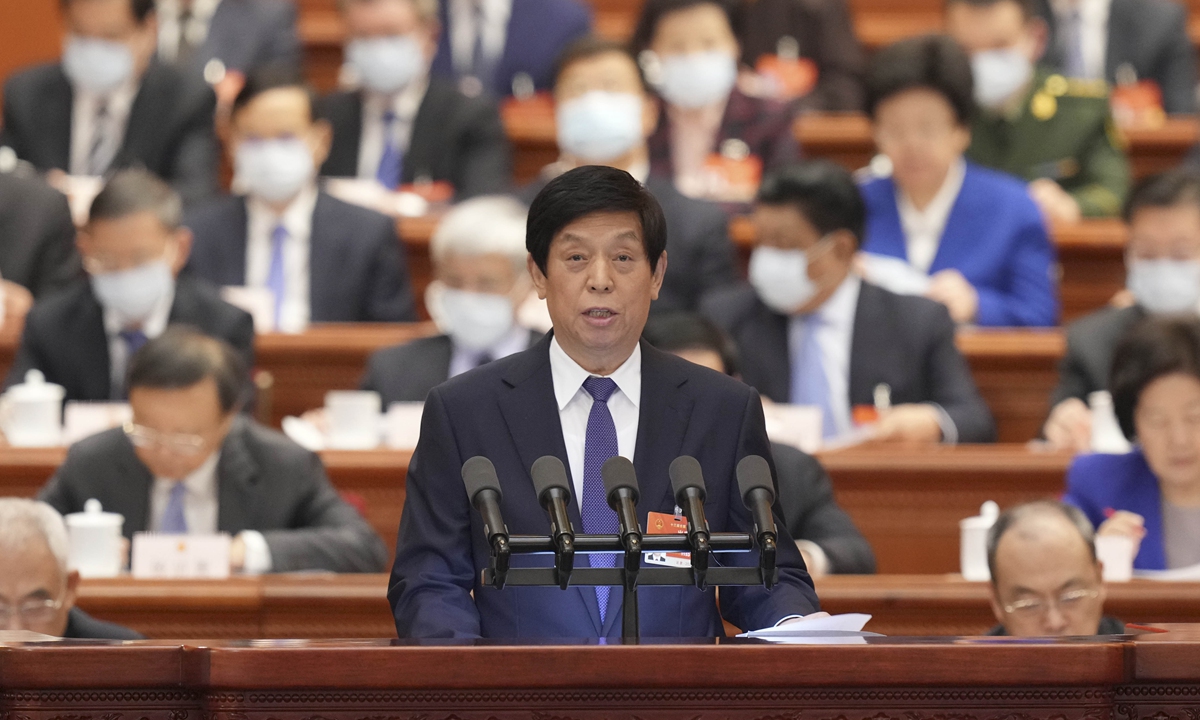China vows to make legislative push to deter unjustified sanctions, expanding legal toolkit as more vigorous protection measures
Legal toolkit expansion signals more vigorous protection measures

Li Zhanshu, chairman of the Standing Committee of the National People’s Congress (NPC), China’s top legislature, delivers a work report of the NPC Standing Committee at the second plenary meeting of the fourth session of the 13th NPC on Monday. Photo: cnsphoto
China's top legislature will work on laws against external sanctions, interference and long-arm jurisdiction in the coming year, which experts said means the country is aiming to take an increasingly active stance and more vigorous measures against the unjustified application of foreign laws and measures against China.Top legislator Li Zhanshu, chairman of the Standing Committee of the National People's Congress (NPC), announced the upcoming legislation in the NPC Standing Committee's work report on Monday.
Li said that China will enhance legislation in foreign-related fields by focusing on moves against sanctions and interference, and countering long-arm jurisdiction, as well as enriching the legal "toolbox" for coping with foreign-related challenges and preventing risks.
From the rollout of the Unreliable Entity List last year to the upcoming legislation, China's countermeasures against unjustified foreign sanctions, notably the US bullying of China, have escalated. It sends a clear signal that China is determined to fight against international hegemony with systematic legal weapons to cope with and deter the unjustified application of foreign laws and measures against China in the fields of trade and political issues, Chinese analysts noted.
Tian Yun, a vice director of the Beijing Economic Operation Association and former economist at the state economic planning agency, told the Global Times that the legislation enacted by the NPC will be national laws under the Constitution, serving as a legal basis for China to launch "equivalent countermeasures" against foreign sanctions.
It mainly targets the US, which has been using its domestic laws to challenge the interests of Chinese enterprises and individuals, Tian said, adding that the passage of such legislation is bound to deter those unjustified sanctions.
From the Unreliable Entity List last year to rules that include the adoption of necessary countermeasures against the unjustified extraterritorial application of foreign legislation released by the Ministry of Commerce in January, China has gradually formed its own body of knowledge in dealing with unjustified foreign sanctions, Huo Jianguo, a vice president of the China Society for World Trade Organization Studies, told the Global Times.
Under these laws, China will be able to adopt more systematic countermeasures against notably the US bullying of China in not only the field of trade but also in political matters such as issues relating to Xinjiang and Hong Kong, Huo said.
Having legislative countermeasures against external interference will be "systematic." Foreign sanctions, interference and long-arm jurisdiction will no longer be free from consequences, and these laws will alter the embarrassing situation of having no laws to resort to when China's interests are undermined, Shen Yi, director at the Research Center for Cyberspace Governance of Fudan University in Shanghai, told the Global Times.
China's legislative plan to deal with foreign sanctions and interference demonstrates China's determination to seek equality and respect in the international community and guard international principles and legal systems with the UN Charter at its core, Li Haidong, a professor at the Institute of International Relations of the China Foreign Affairs University, told the Global Times on Monday.
The professor said these laws will eventually form a "legal cornerstone" for China to win respect in its interactions with other countries and in the fight against hegemony.
These measures are likely to define foreign sanctions and interference, preventing foreign countries from distorting the interpretation of the legal aspects of international rules, the expert added.
In January, China's Foreign Ministry announced sanctions on 28 American anti-China politicians who served under former US president Donald Trump including former secretary of state Mike Pompeo.
Analysts said that the legislation does not aim to provide a tool for China to impose sanctions on or interfere with the internal affairs of other countries. It only acts as a defensive weapon for China to counter international hegemony and unjustified sanctions against China, they said.
Similarly, during the two sessions last year, NPC deputies proposed a state immunity law to counter US' abuse of litigation.
Ma Yide, a deputy to the NPC and law researcher at the Beijing Academy of Social Sciences, told the Global Times that because China faces "political farces" by some US politicians and their allies, from repeatedly politicizing COVID-19 and stigmatizing other countries, to the cliché of claiming compensation, it is urgent for China to enact a law to counter the US' abuse of litigation.
Alongside the deepening of international exchanges and acceleration of globalization, China faces more and more litigation in other countries and regions due to the proliferation of conflicts and contradictions in economic and trade contacts, experts said.
Global Times

